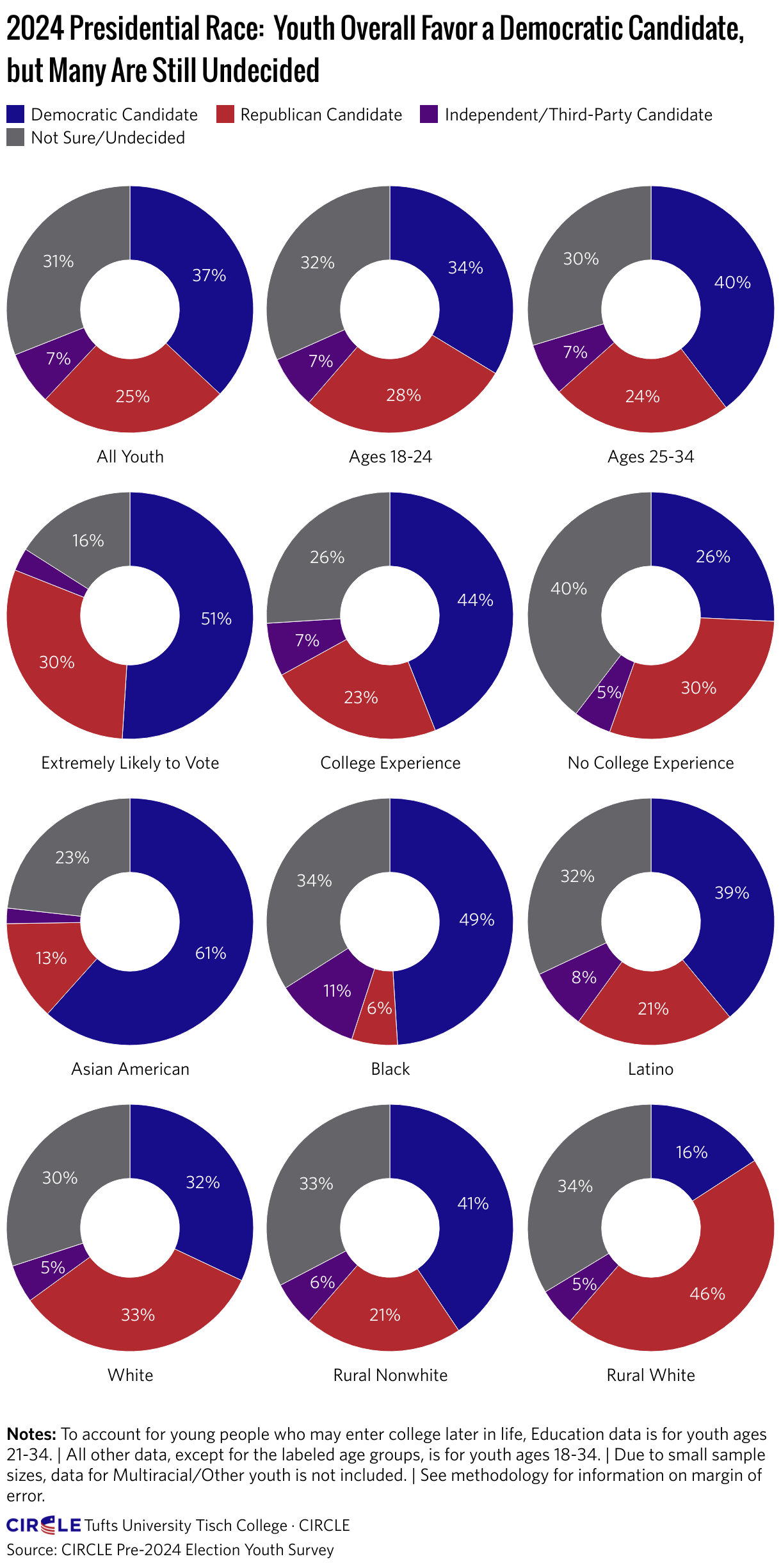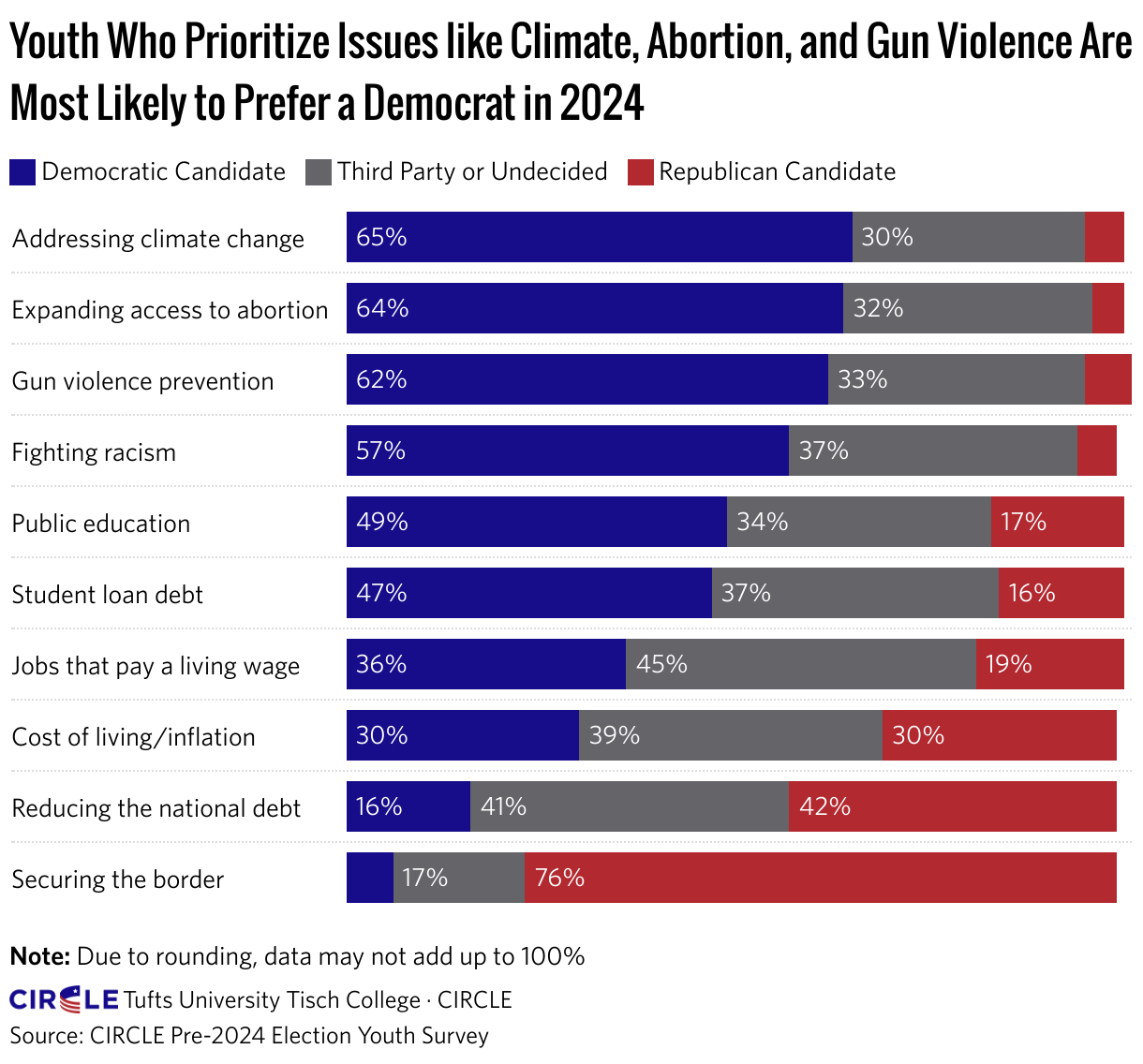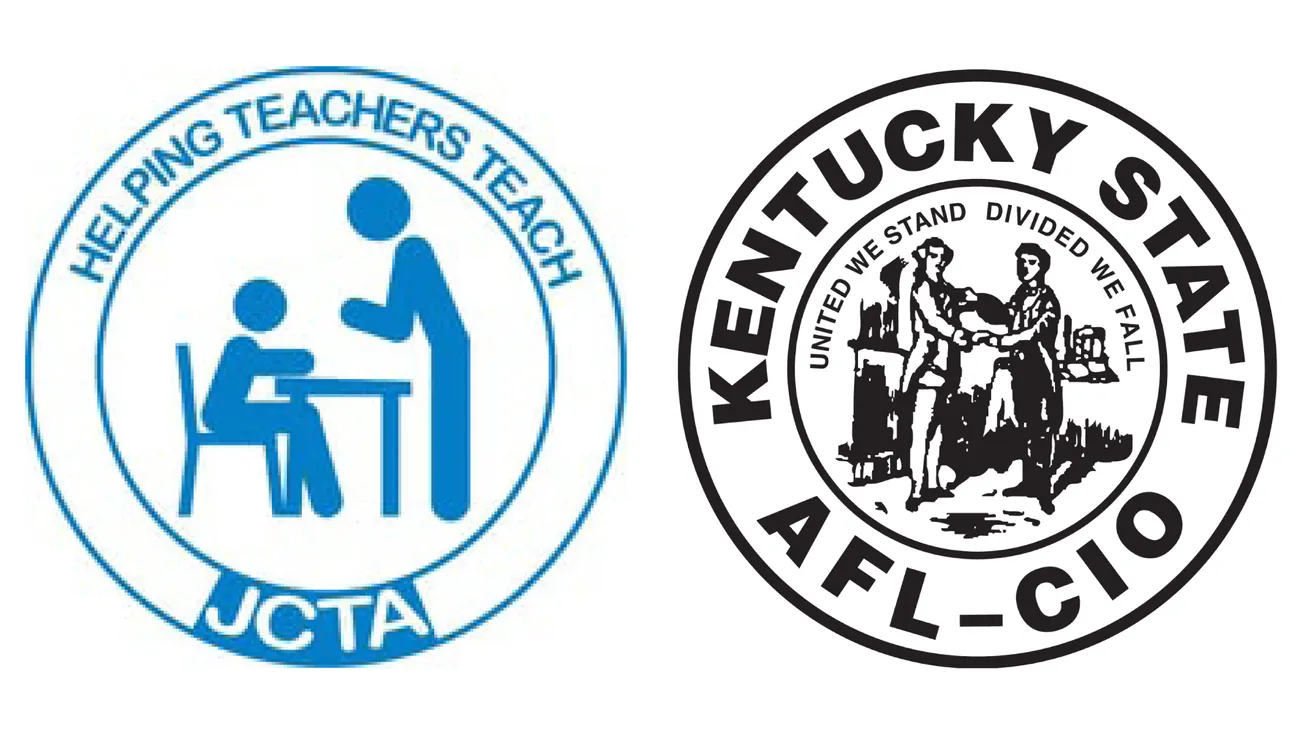Almost a year away from the 2024 presidential election, a majority of young people consider themselves extremely likely to vote. Overall, young people remain more supportive of a Democratic candidate and are concerned about major issues like the cost of living, gun violence, and climate change.
Among youth extremely likely to vote, 16% say they’re undecided about who to vote for in the presidential election, and very few have seen information from candidates and campaigns. Many youth are facing financial or mental struggles that make them less likely to vote unless they receive information and support for electoral participation.
These takeaways and trends come from the CIRCLE Pre-2024 Election Youth Survey conducted by the Center for Information & Research on Civic Learning and Engagement, the preeminent nonpartisan research center on youth civic engagement based at Tufts University’s Jonathan M. Tisch College of Civic Life. The CIRCLE Pre-2024 Election Youth Survey was conducted with the collaboration of two climate-focused organizations, and includes more detailed data on this issue.
Key findings and graphs





This nationally representative poll of young people, ages 18-34, finds:
- Majority of Youth Say They’ll Vote in 2024: 57% of young people say they’re “extremely likely” to vote in 2024; another 15% say they’re “fairly likely.” Young people who say they cast a ballot in the past two national elections are especially likely to vote in 2024. That is consistent with previous CIRCLE research about voting being habitual and underscores the need to engage youth who have not participated in recent cycles.
- Likeliest Voters Show Stronger Support for Democratic Presidential Candidate: Among youth who are extremely likely to vote, 51% intend to support the Democratic candidate in 2024, 30% the Republican, and 16% are undecided. Among all youth in the survey (regardless of likelihood to vote), 37% support a Democrat, 25% a Republican, and 31% are undecided.
- Economy, Guns, and Climate Key Issues for Youth: When asked about their issue priorities, more than half of youth (53%) selected cost of living/inflation as one of their top three concerns, followed by jobs that pay a living wage (28%), gun violence prevention, and addressing climate change (both 26%).
- Climate Focus Connected to Voting: Youth who chose addressing climate change as one of their top concerns were 20 points more likely than those who did not to say they’re extremely likely to vote in 2024, and more likely to engage in various forms of political action.
- Mental Health Crisis Affecting Engagement: Close to half of young people say they’re struggling with loneliness or lack of confidence, and those who do are less likely to say they will vote.
Read the full survey analysis here.
“Young voters have been participating at historically high rates in recent elections, and their votes are consequential. 40 million Gen Z voters, who came of age already deeply engaged with politics, are eligible to cast a ballot in 2024, and together they have the potential to keep shaping our democracy,” says Dr. Kei Kawashima-Ginsberg, Newhouse Director of CIRCLE. “But continued high electoral engagement is not a given, and our survey reveals some of the troubling trends that could keep them away from the ballot as well as opportunities to motivate and mobilize them based on their needs and concerns.”
High potential for youth turnout, but some need more information and support
Nearly 6 in 10 (57%) of young people say they’re extremely likely to vote in the 2024 presidential election; previous tracking has shown that this measure of likelihood on pre-election polls tend to approximate actual future turnout.
Some young people, notably Black youth (44%), nonwhite rural youth (48%), and youth without college experience are less likely to say they’ll vote in 2024. In some instances, these differences reflect deficiencies in information and support for electoral participation revealed by the survey.
Young people who say they are extremely likely to vote are also most likely to say they’ve settled on a 2024 choice: 51% for the Democratic candidate, 30% for a Republican, and 16% undecided. However, data about all youth in the survey indicates an opportunity to engage more youth over the next year as nearly a third (31%) say they’re undecided, and the gap in support for a Democrat (37%) and a Republican (25%) is much narrower.
Understanding diverse issue priorities key to engagement
By a wide margin, young people rated the cost of living/inflation as their main concern: 53% chose it as one of their top three issues, followed by jobs that pay a living wage (28%), addressing climate change (26%), gun violence prevention (26%), and expanding abortion access and reproductive healthcare (19%).
Young people prioritize issues differently based on their identities and experiences. The CIRCLE survey showed that Black youth were more likely to prioritize gun violence prevention, fighting racism, and student loan debt. Understanding these differences among youth is critical for candidates and campaigns seeking to mobilize and motivate youth.
The data also reveals that some issues appear to be strongly linked to young people’s electoral participation. Youth who selected climate change as a top concern were 20 percentage points more likely than those who did not to say they’re extremely likely to vote in 2024. Climate-focused youth are also exceedingly more likely to prefer a Democratic presidential candidate (65%) than a Republican (4%), whereas preferences are much closer for youth who prioritize the cost of living/inflation.
Focus on newest eligible and previously disengaged key to expanding youth electorate
By far the strongest association with likelihood to vote in 2024 is whether a young person voted in 2020 and/or 2022. Nearly 3 in 4 (72%) of youth in the survey who were eligible and reported voting in 2020 say they’re extremely likely to vote in 2024, compared to just 4% of those who reported not voting in 2020. This underscores the need to reach and engage both the 8 million youth who will have aged into the electorate since the midterm election and those who have been eligible in previous cycles but have not cast a ballot.
The survey data confirms that young people are more likely to vote when they are seeing and hearing information about politics and issues from multiple sources. While many youth are hearing about politics and elections from their personal networks and from news outlets, information is sorely lacking from parties and organizations. Only 19% of youth say they’ve heard about issues and politics in 2023 from a political party or campaign, and just 14% from a community organization or local group. Only about a third (35%) of youth say they have support in their communities to understand and act on information about politics—which is worrying given concerns about misinformation in a complex media and social media landscape.
That support may be especially critical for youth who are newly eligible to vote or have not participated before, as well as for youth who may be struggling with mental health. Fifty-two percent of youth in the CIRCLE survey reported feeling a lack of confidence, and 46% feeling like their life was not in their control during at least multiple days recently. The well-documented mental health crisis among youth has an impact on political participation: youth who report these struggles are also much less likely to say they will vote in 2024. However, the data suggests that negative impact can be mitigated by support in and from their communities.
“We’re heading into another hugely consequential national election, and young people are telling us that they want to see change, want to participate in decision-making about the future, and they care deeply about issues,” said Abby Kiesa, CIRCLE’s deputy director. “It’s up to all of us—youth groups, elected officials, schools, parents, nonprofits—to listen, to create supportive pathways for these newer eligible voters that reduce inequities and expand the youth electorate for a more representative democracy.”
--30--
Written by Alberto Medina of the Jonathan M. Tisch College of Civic Life at Tufts University. Cross-posted from Newswise.
The Center for Information & Research on Civic Learning and Engagement (CIRCLE) is a non-partisan, independent research organization focused on youth civic engagement in the United States. They conduct extensive research on youth participation, and leverage that research to improve opportunities for all young people to acquire and use the skills and knowledge they need to meaningfully participate in civic life. In all of their work, they are especially concerned with understanding, addressing, and ultimately eliminating the systemic barriers that keep some young people marginalized from and underrepresented in civic life. CIRCLE is part of the Tisch College of Civic Life at Tufts University.
The CIRCLE Pre-2024 Election Youth Survey was supported by Action for the Climate Emergency (ACE) and Climate Power. ACE is a national 501(c)(3) nonprofit organization that works at the nexus of youth, climate, media, and civic engagement to accelerate our pathway to a decarbonized world. ACE engaged more than 30 million young voters in its nonpartisan voter education and civic engagement programs during the 2022 midterm elections. ACE utilizes leading-edge media strategies to combat dangerous disinformation, drive action-taking, and increase diverse participation in the democratic process. Climate Power is an independent strategic communications and paid media operation focused on educating Americans about climate action. Climate Power integrates hard-hitting research, polling, state and national earned media, digital and paid media to elevate the urgency of the climate crisis and inform the public about the bold action taken to combat climate change.
Additional support was provided by the Rural Democracy Initiative, the Alliance for Youth Action, and Kettering Foundation.







